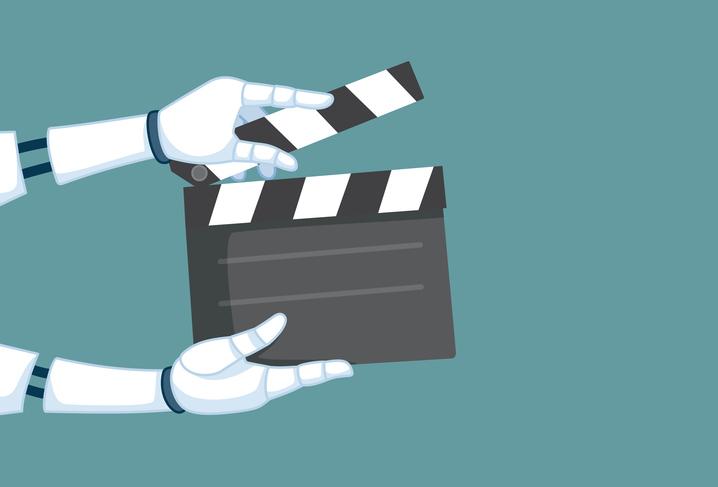This video covers:
2:41 Transcribe content using the speech-to-text function
3:04 Review and refine your content, aligning it with learning outcomes
3:31 Use voice clones and AI avatars to seamlessly edit your content without rerecording

This video covers:
2:41 Transcribe content using the speech-to-text function
3:04 Review and refine your content, aligning it with learning outcomes
3:31 Use voice clones and AI avatars to seamlessly edit your content without rerecording
Hello, I’m real-life Amy. I’m an instructional designer at Hong Kong UST. Hello, I am AI Amy. Can you see the difference? From now on, this will be narrated by AI. I am excited to share how generative AI can unlock the potential of repurposing online recordings for enhanced blended learning. Educational videos are now essential resources in higher education, serving as vital content delivery tools in flipped, blended and online classes. However, producing high-quality video recordings can be challenging.
In the past year, the global education community has faced significant challenges due to the rapid shift toward digital learning. Traditional face-to-face classrooms have transformed into online and hybrid formats, necessitating quick adaptation from faculty and teaching staff. Many have turned to platforms like Zoom, resulting in a wealth of recorded content. Yet, while these recordings often serve as backups, they have the potential to be transformed into effective educational tools. Today’s students are no longer confined to textbooks and lecture notes. They increasingly turn to videos to learn software, solve problems and acquire new skills. As educators, we may hesitate, wondering if we need to master video editing or recording techniques.
Achieving clarity and engagement in a single take is challenging. This is where generative AI steps in to simplify and streamline the content enhancement process. By leveraging generative AI technologies, we can repurpose our recordings for blended learning environments, making them more accessible and engaging.
Importantly, this innovative approach allows us to enhance materials for future iterations without the need for constant rerecording. By analysing student feedback and learning patterns, we can refine our videos for subsequent runs, ensuring our online content continually evolves to meet learners’ needs. This adaptive strategy not only boosts student engagement but also maximises the effectiveness of our teaching strategies.
Generative AI provides practical solutions to enhance your video development process. Here’s how:
Step one, transcription. Utilise the speech to text capability of generative AI to convert audio extracted from lectures, whether face-to-face or Zoom, into written transcripts. This feature allows for easier review and refinement of your materials. By automating transcription, you save valuable time and can focus on enhancing the clarity of your content.
Step two, review and refine. Once transcription is complete, you can edit the script to improve coherence and align the content with desired learning outcomes. This step is crucial for ensuring that your message resonates with students and effectively conveys the intended concepts.
Step three, voice cloning and AI mirror avatar. Generative AI also enables you to create voice clones and AI avatars, eliminating the need for extensive re-recording. This capability allows you to deliver engaging, error-free speech, facilitating a smoother learning experience for students as they follow along and grasp complex concepts more easily.
Let’s explore a scenario where an instructor has recorded content and identified opportunities for refinement during the review process. With the assistance of generative AI, the instructor can streamline content refinement in three simple steps, prioritising substance over technical challenges. Transcribe. Upload your recorded audio from a face-to-face lecture or Zoom session to a speech to text tool. The transcription process is quick and efficient, allowing you to add the text to your document for further refinement.
Review and edit. With the transcription in hand, edit the script to enhance clarity and coherence, aligning it with your learning objectives. Clone your voice and your own AI avatar. Utilise digital clone technology to create a digital version of your voice and an AI avatar. This process is straightforward and involves either recording new audio video or uploading an existing sample.
Once everything is ready, we can thoughtfully integrate the digital version of your voice and your AI avatar into the PowerPoint slide deck, allowing for easy addition or editing of new content without affecting the entire video rerecording. Please pause the video and scan the QR code to see how this works in the final output of the educational video.
By leveraging generative AI technologies, these tools provide time-saving benefits for upcycling recorded content. Instructors can effectively repackage their knowledge assets and implement a blended learning approach. While AI tools offer significant advantages, they are designed to assist, not replace, educators’ expertise. Your role in reviewing and refining content is essential to ensure accuracy and alignment with instructional goals. For educational videos to truly engage learners, technical skills must be paired with sound pedagogical principles to maximise learning effectiveness. Integrating generative AI into video production not only saves time but also reduces the need for extensive space and equipment set-up. Most importantly, it enhances the overall learning experience by utilising the expertise of content specialists in script development. By balancing technology with human involvement, we can create more effective and engaging educational resources for our students.
Amy Chong is an instructional designer at Hong Kong University of Science and Technology.
If you would like advice and insight from academics and university staff delivered direct to your inbox each week, sign up for the Campus newsletter.
comment10
(No subject)
(No subject)
(No subject)
(No subject)
(No subject)
(No subject)
(No subject)
(No subject)
(No subject)
(No subject)